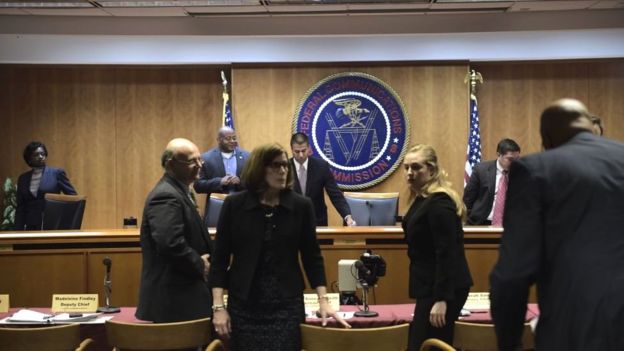Restrictions on US broadband providers' ability to prioritise one service's data over another are to be reduced after a vote by a regulator.
The Federal Communications Commission voted three to two to change the way "net neutrality" is governed.
Internet service providers (ISPs) will now be allowed to speed up or slow down different companies' data, and charge consumers according to the services they access.
But they must disclose such practices.
Ahead of the vote, protesters rallied outside the FCC's building to oppose the change.
Many argue the reversal of rules introduced under President Barack Obama will make the internet less open and accessible.
The decision is already facing legal challenges, with New York's attorney general, Eric Schneiderman, announcing he will lead a lawsuit challenging the FCC's decision.
Mr Schneiderman accused the watchdog of failing to investigate possible abuse of the public commenting process. He said as many as two million identities, some of dead New Yorkers, were used to post comments to the FCC website.
During the hearing, FCC commissioner Mr Michael O'Rielly hit back at those claims, saying staff had been able to determine and discard comments that were illegitimate.
Thursday's proceedings in Washington were halted for about 15 minutes after a security alert forced an evacuation of the FCC's chamber, the final twist in a bitter and at times vitriolic debate.

The FCC's chairman, Ajit Pai, argues the changes will foster innovation and encourage ISPs to invest in faster connections for people living in rural areas.
He refers to the change as "restoring internet freedom".
Technically, the vote was to reclassify broadband internet as an information service rather than telecommunications.
The consequence of this is that the FCC will no longer directly regulate ISPs.
Instead, jurisdiction will pass to another regulator, the Federal Trade Commission (FTC). Its key responsibility will be to check that the companies disclose if they block data, throttle it or offer to prioritise traffic, rather than stopping such behaviour.
One criticism of this is that US consumers often have few if any ISPs to choose between. Moreover, opponents of the change claim it could take years to address any misbehaviour.
"I dissent to this legally-lightweight, consumer-harming, corporate-enabling, destroying-internet freedom order," said Democrat commissioner Mignon Clyburn ahead of the vote.
But fellow commissioner Mr O'Rielly, a Republican, said fears over the end of net neutrality were a "scary bedtime story for the children of telecom geeks".
Latest Stories
-
Morocco’s Family Code revision proposals unveiled in Rabat
16 minutes -
Saglemi fire: No documents lost, redevelopment project unaffected – Oppong Nkrumah
26 minutes -
WAEC uncertain about meeting Dec. 29 deadline for WASSCE results
46 minutes -
‘She Leads Project’ calls for more female representation in politics to address women’s issues
52 minutes -
DJ Promise crowned Best Radio DJ at Dangme Music Awards 2024
52 minutes -
Re-collation: Court sets Dec. 27 to hear NDC’s suit against EC
1 hour -
Let’s remain positive, optimistic, and with calmness, rebrand our party – Afenyo-Markin
2 hours -
L’aîné HR celebrates 30 years of excellence in HR management in Ghana
2 hours -
Corporate Wellness: Elegant Homes emphasizes impact of Annual Health and Family Fun Day
3 hours -
BoG issues bancassurance directives to stakeholders in financial sector; warns of sanctions
3 hours -
African Paralympic Committee President sends festive greetings to fraternity
4 hours -
Ghana-Russia Centre holds its first corporate social responsibility event in Ghana
4 hours -
Mozambique’s opposition leader vows to install himself as president
4 hours -
‘Politics will come and go’ – Afenyo-Markin calls for national development
4 hours -
We thank God for the peace we have in the country – Afenyo Markin
4 hours
